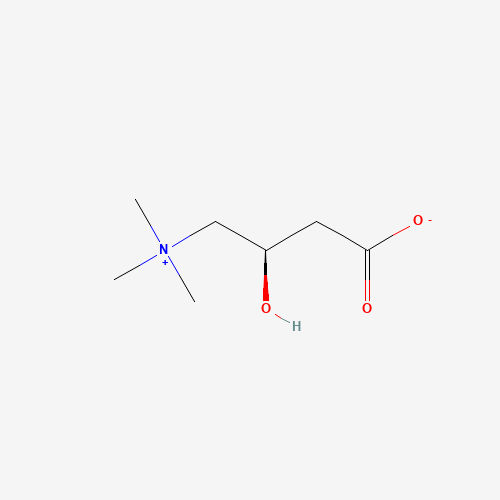
L-Carnitine Manufacturer
Gensei is a leading L-Carnitine supplier and L-Carnitine manufacturer, operating a specialized l-carnitine powder factory. We provide high-quality L-Carnitine bulk in powder form, essential for dietary supplements aimed at energy metabolism, fat transport, and athletic performance. Our manufacturing process ensures a pure and consistent product. As your reliable L-Carnitine supplier and l-carnitine powder factory, Gensei offers competitive pricing on L-Carnitine wholesale orders. Choose Gensei for your L-Carnitine bulk needs and benefit from our expertise and reliable supply chain.
Please note: We are a wholesale supplier and have minimum order quantities.
Have questions about this product? Our team is here to help. For inquiries about multiple ingredients, please use the Contact Us option and include the list of ingredients in your message.
L-Carnitine CAS No.: 541-15-1
Chemical Name: (R)-(−)-3-Carboxy-2-hydroxy-N,N,N-trimethyl-1-propanaminium inner salt
Synonyms:
- Levocarnitine
- Carnitine (referring specifically to the L-isomer, which is the biologically active form)
- Vitamin BT (an outdated term)
CB Number: CB7280569
Molecular Formula: C₇H₁₅NO₃
Molecular Weight: 161.20 g/mol
MDL Number: MFCD00004624

L-Carnitine manufacturing process
L-Carnitine is typically produced through fermentation or chemical synthesis.
(Microorganisms, Nutrient Media)
(Microorganisms are cultured to produce L-Carnitine precursors or L-Carnitine)
(L-Carnitine or precursors are extracted and converted if needed)
(The extracted L-Carnitine is purified and crystallized)
(Chemical Precursors)
(Multiple synthesis reactions to form the L-Carnitine molecule)
(The synthesized L-Carnitine is purified and crystallized)
(Washing the L-Carnitine crystals to remove residual impurities/solvents)
(Drying the purified L-Carnitine to obtain powder)
(To achieve desired particle size)
(Testing for purity, assay, heavy metals, isomers, etc.)
(L-Carnitine powder is packaged in suitable containers)
This flowchart provides a general overview of L-Carnitine manufacturing via fermentation or chemical synthesis. Specific steps may vary by manufacturer.
Why Choose Gensei as Your L-Carnitine Supplier?
Choosing Gensei as your L-Carnitine supplier ensures you partner with a reliable L-Carnitine manufacturer and l-carnitine powder factory. We specialize in providing high-quality L-Carnitine bulk for various applications. Our manufacturing process guarantees pure and potent L-Carnitine, essential for energy metabolism and performance supplements.
As your dedicated L-Carnitine supplier, we offer competitive L-Carnitine wholesale pricing and a robust supply chain for l-carnitine bulk. Trust Gensei, your experienced L-Carnitine manufacturer and l-carnitine powder factory, for consistent quality and dependable L-Carnitine bulk supply.
Features and Benefits
- Chiral Form: The biologically active form is the L-isomer (Levocarnitine). Supplements should primarily contain L-Carnitine, not D-Carnitine.
- Role in Metabolism: Crucial for transporting long-chain fatty acids into the mitochondria for energy production.
- Appearance: Typically a white, crystalline powder.
- Solubility: Highly soluble in water.
- Occurrence: Found naturally in animal products, particularly red meat.
Applications
- Dietary Supplements: Popular in sports nutrition and weight management supplements to support fat metabolism, improve endurance, reduce muscle soreness, and aid recovery.
- Medical Applications: Used in some cases to treat L-Carnitine deficiency caused by genetic disorders, kidney disease, or certain medications.
- Infant Formula: Added to some infant formulas.
- Pet Food: Included in some pet foods and supplements for energy metabolism and heart health support.
Our State-of-the-Art Manufacturing Facilities
Explore our modern facilities equipped with advanced technology to ensure the highest quality in the production of your vitamins, herbal extracts, minerals, and amino acids.











FAQs
L-Carnitine is not commonly known to cause diarrhea or significantly affect bowel movements at typical dosages. High doses might potentially cause mild gastrointestinal upset in some individuals.
The effects of L-Carnitine, particularly for athletic performance or fat metabolism, are often seen over time with consistent supplementation rather than immediately after a single dose. Benefits may become noticeable after several weeks or months of regular use.
Yes, you can take L-Carnitine at night. It is not a stimulant and is not known to interfere with sleep.
No, L-Carnitine itself does not contain caffeine. They are different compounds. L-Carnitine is often included in energy or pre-workout supplements that do contain caffeine, but L-Carnitine itself is caffeine-free.
Phentermine is a prescription weight-loss medication. It is crucial to consult with your doctor before taking L-Carnitine or any other supplement if you are taking phentermine, as potential interactions or contraindications may exist.
L-Carnitine can be administered by injection (intravenously or intramuscularly) in medical settings, particularly for treating deficiencies. Subcutaneous injection (under the skin) is less common and may not be the preferred route. Any injectable use of L-Carnitine should only be done by a qualified healthcare professional.
Yes, taking L-Carnitine breaks a fast from a caloric perspective, as it contains calories.
There is limited scientific evidence to suggest that L-Carnitine supplementation significantly increases testosterone levels in healthy individuals. Some studies in specific populations or conditions have explored potential hormonal effects, but it is not a primary known function.
The amount of L-Carnitine in energy drinks like Monster varies depending on the specific product and formulation. You would need to check the ingredient label on the specific Monster drink product to find the exact amount, which is usually listed in milligrams (mg).
Yes, you can take L-Carnitine on an empty stomach. Some sources suggest absorption might be slightly better with food, particularly carbohydrates, as insulin can play a role in cellular uptake. However, taking it on an empty stomach is generally well-tolerated.
Metformin is a medication for managing blood sugar. There is some research exploring the potential combined effects of L-Carnitine and metformin, particularly related to energy metabolism and nerve function in diabetic individuals. However, you should always consult with your doctor before taking L-Carnitine or any other supplement if you are taking metformin.
Injectable L-Carnitine is a legal prescription medication in some countries for treating specific medical conditions involving carnitine deficiency. However, obtaining and using injectable L-Carnitine without a prescription from a qualified medical professional is generally not legal and carries risks.
Yes, inositol and L-Carnitine are often taken together, particularly in supplements targeting metabolic health or women's health (like PCOS). There are no known negative interactions between them, and they may have complementary effects on glucose metabolism and cellular energy.

